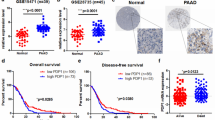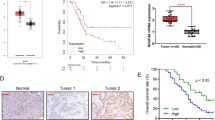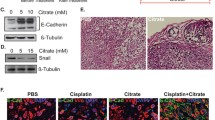Abstract
ATP citrate lyase (ACLY) is responsible for the conversion of cytosolic citrate into acetyl-CoA and oxaloacetate, and the first rate-limiting enzyme involved in de novo lipogenesis. Recent studies have demonstrated that inhibition of elevated ACLY results in growth arrest and apoptosis in a subset of cancers; however, the expression pattern and underlying biological function of ACLY in pancreatic ductal adenocarcinoma (PDAC) remains unclear. In the current study, overexpressed ACLY was more commonly observed in PDAC compared to normal pancreatic tissues. Kaplan–Meier survival analysis showed that high expression level of ACLY resulted in a poor prognosis of PDAC patients. Silencing of endogenous ACLY expression by siRNA in PANC-1 cells led to reduced cell viability and increased cell apoptosis. Furthermore, significant decrease in glucose uptake and lactate production was observed after ACLY was knocked down, and this effect was blocked by 2-deoxy-d-glucose, indicating that ACLY functions in the Warburg effect affect PDAC cell growth. Collectively, this study reveals that suppression of ACLY plays an anti-tumor role through decreased Warburg effect, and ACLY-related inhibitors might be potential therapeutic approaches for PDAC.



Similar content being viewed by others
References
Siegel R, Ma J, Zou Z, Jemal A. Cancer statistics, 2014. CA Cancer J Clin. 2014;64(1):9–29. doi:10.3322/caac.21208.
The Lancet Oncology. Pancreatic cancer in the spotlight. Lancet Oncol. 2014;15(3):241. doi:10.1016/S1470-2045(14)70097-X.
Finley LW, Zhang J, Ye J, Ward PS, Thompson CB. SnapShot: cancer metabolism pathways. Cell Metab. 2013;17(3):466. doi:10.1016/j.cmet.2013.02.016.
Watson JA, Fang M, Lowenstein JM. Tricarballylate and hydroxycitrate: substrate and inhibitor of ATP: citrate oxaloacetate lyase. Arch Biochem Biophys. 1969;135(1):209–17.
Yancy HF, Mason JA, Peters S, Thompson CE 3rd, Littleton GK, Jett M, et al. Metastatic progression and gene expression between breast cancer cell lines from African American and Caucasian women. J Carcinog. 2007;6:8. doi:10.1186/1477-3163-6-8.
Migita T, Narita T, Nomura K, Miyagi E, Inazuka F, Matsuura M, et al. ATP citrate lyase: activation and therapeutic implications in non-small cell lung cancer. Cancer Res. 2008;68(20):8547–54. doi:10.1158/0008-5472.CAN-08-1235.
Varis A, Wolf M, Monni O, Vakkari ML, Kokkola A, Moskaluk C, et al. Targets of gene amplification and overexpression at 17q in gastric cancer. Cancer Res. 2002;62(9):2625–9.
Turyn J, Schlichtholz B, Dettlaff-Pokora A, Presler M, Goyke E, Matuszewski M, et al. Increased activity of glycerol 3-phosphate dehydrogenase and other lipogenic enzymes in human bladder cancer. Horm Metab Res. 2003;35(10):565–9. doi:10.1055/s-2003-43500.
Zhou Y, Bollu LR, Tozzi F, Ye X, Bhattacharya R, Gao G, et al. ATP citrate lyase mediates resistance of colorectal cancer cells to SN38. Mol Cancer Ther. 2013;12(12):2782–91. doi:10.1158/1535-7163.MCT-13-0098.
Gao Y, Islam MS, Tian J, Lui VW, Xiao D. Inactivation of ATP citrate lyase by Cucurbitacin B: a bioactive compound from cucumber, inhibits prostate cancer growth. Cancer Lett. 2014;349(1):15–25. doi:10.1016/j.canlet.2014.03.015.
Hatzivassiliou G, Zhao F, Bauer DE, Andreadis C, Shaw AN, Dhanak D, et al. ATP citrate lyase inhibition can suppress tumor cell growth. Cancer Cell. 2005;8(4):311–21. doi:10.1016/j.ccr.2005.09.008.
Mashima T, Seimiya H, Tsuruo T. De novo fatty-acid synthesis and related pathways as molecular targets for cancer therapy. Br J Cancer. 2009;100(9):1369–72. doi:10.1038/sj.bjc.6605007.
Bauer DE, Hatzivassiliou G, Zhao F, Andreadis C, Thompson CB. ATP citrate lyase is an important component of cell growth and transformation. Oncogene. 2005;24(41):6314–22. doi:10.1038/sj.onc.1208773.
Warburg O. On respiratory impairment in cancer cells. Science. 1956;124(3215):269–70.
Ying H, Kimmelman AC, Lyssiotis CA, Hua S, Chu GC, Fletcher-Sananikone E, et al. Oncogenic Kras maintains pancreatic tumors through regulation of anabolic glucose metabolism. Cell. 2012;149(3):656–70. doi:10.1016/j.cell.2012.01.058.
MacDonald MJ, Smith AD 3rd, Hasan NM, Sabat G, Fahien LA. Feasibility of pathways for transfer of acyl groups from mitochondria to the cytosol to form short chain acyl-CoAs in the pancreatic beta cell. J Biol Chem. 2007;282(42):30596–606. doi:10.1074/jbc.M702732200.
MacDonald MJ, Longacre MJ, Langberg EC, Tibell A, Kendrick MA, Fukao T, et al. Decreased levels of metabolic enzymes in pancreatic islets of patients with type 2 diabetes. Diabetologia. 2009;52(6):1087–91. doi:10.1007/s00125-009-1319-6.
Zaidi N, Swinnen JV, Smans K. ATP-citrate lyase: a key player in cancer metabolism. Cancer Res. 2012;72(15):3709–14. doi:10.1158/0008-5472.CAN-11-4112.
Beigneux AP, Kosinski C, Gavino B, Horton JD, Skarnes WC, Young SG. ATP-citrate lyase deficiency in the mouse. J Biol Chem. 2004;279(10):9557–64. doi:10.1074/jbc.M310512200.
Migita T, Okabe S, Ikeda K, Igarashi S, Sugawara S, Tomida A, et al. Inhibition of ATP citrate lyase induces an anticancer effect via reactive oxygen species: AMPK as a predictive biomarker for therapeutic impact. Am J Pathol. 2013;182(5):1800–10. doi:10.1016/j.ajpath.2013.01.048.
Lee JH, Jang H, Lee SM, Lee JE, Choi J, Kim TW, et al. ATP-citrate lyase regulates cellular senescence via an AMPK- and p53-dependent pathway. FEBS J. 2015;282(2):361–71. doi:10.1111/febs.13139.
Hanahan D, Weinberg RA. Hallmarks of cancer: the next generation. Cell. 2011;144(5):646–74. doi:10.1016/j.cell.2011.02.013.
Potapova IA, El-Maghrabi MR, Doronin SV, Benjamin WB. Phosphorylation of recombinant human ATP:citrate lyase by cAMP-dependent protein kinase abolishes homotropic allosteric regulation of the enzyme by citrate and increases the enzyme activity. Allosteric activation of ATP:citrate lyase by phosphorylated sugars. Biochemistry. 2000;39(5):1169–79.
Beckner ME, Fellows-Mayle W, Zhang Z, Agostino NR, Kant JA, Day BW, et al. Identification of ATP citrate lyase as a positive regulator of glycolytic function in glioblastomas. Int J Cancer. 2010;126(10):2282–95. doi:10.1002/ijc.24918.
Acknowledgments
This research is supported by Health Bureau of Nanjing, China (Grant No. ZKX12040).
Conflict of interest
The authors declare that there is no conflict of interests.
Author information
Authors and Affiliations
Corresponding author
Additional information
Haifeng Zong and Yang Zhang have contributed equally to this work.
"This article has been retracted by the authors as it was discovered that duplication of several key experiments described herein were not possible because: The difference between acidification of culture medium in si-Ctrl group and si-ACLY could not be observed and the results of lactate production and glucose consumption could not be repeated. The authors regret any confusion caused."
About this article
Cite this article
Zong, H., Zhang, Y., You, Y. et al. RETRACTED ARTICLE: Decreased Warburg effect induced by ATP citrate lyase suppression inhibits tumor growth in pancreatic cancer. Med Oncol 32, 85 (2015). https://doi.org/10.1007/s12032-015-0540-z
Received:
Accepted:
Published:
DOI: https://doi.org/10.1007/s12032-015-0540-z




